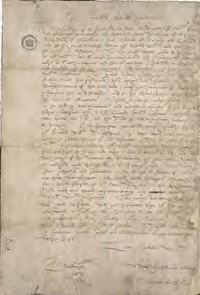



|
|
|
Scotland's very own ISP |
|
The new ferry service from Rosyth to Zebrugge has been operating regularly this summer but links between Scotland and the Low Countries are as old as ocean-going trade in this part of the world. |
|
As evidence here is a letter written to Charles II in 1664 by Scottish traders with the Low Countries. ( see illustration below on the left) |
|
FERRY SERVICE IN 1664 - CHARLES II |

|
|
|
|
|
|
|
|
|
|
|
|
|
|
|
Charles II Letter |
|
1664 |

|
Text of the letter on left |
|
Most Secred Souerayne |
|
Understanding of the Great Ambassidis cumed unto yr Majestie from all forayne princess, and specialye from the King of Spagne, Archeduik of flanderis, and Estates off Holand and Zeland, and of the great treatiess, betwixt yr Sacred Majestie, and the sundrie princess and Estates, We haiff thought good to insinuat to yr Majestie as our maist Gracious Lord and Souarayne, nocht onlye in our awin nayme and for our enteres, Bot als in nayme and behalff of all the remanent Borowises of this your Majesties kingdome, The great hinder quhilk the haill Burrowis of the Land hes susteyned, this manye and diverse years through want of the free tred, with the Countrie of flanderis, quhairfraa thay are debarred, Bye the |
|
Wearschippis of the Estates of Holand allanerlie,Quhilk is nocht onlye hinderfull to the tred of merchandice and merchand estate of this Countrie Bot hinderfull also to yr Sacred Majesties customs, quhilk is ever mair and less, as the Tred of Merchandice incressis or decayce. Quhairfore we wald maist humblye beseik yr Sacred Majestie, to obteyne, bye onye treatie or moyanis with the saides princess and Estates, That the haill Schippes and merchandice of this yr Majesties Kingdom, might have free passage to gang and cum, and Liberties to By and sell with onye of the Townis or Provinces of flanderis untroubled or molested ather by the King of Spayne and Archeduik, Thair subjectis and servandis, or be the Estaites of Holand or thair Weareschippis, Quhilk wald inlairge and amplifye by far, the traffique of yr Majesties subjectis in yr kingdom and mak ane great augmentation also yearlye to yr Majesties customes. This nocht doubting Bot yr Majestie will consider, with that Gracious Eye yr hienes is accustomat to luik on all, that may be for yr subjectis weal and prosperitie Maist humblye taking our Leive Pray to The Eternall God fra all our heartes To Prosper and maintein yr Gracious hienes sceptre and Authoritie Long above us. |
|
We rest |
|
Your Sacred Majesties |
|
Maist humbell and obedient |
|
Subjectis and Servandis |
|
Edinburgh February 1664 |
|
The trading links often centred on the port of Antwerp, 40 miles from Zebrugge. Long before Belgium became an independent state in 1830, it was known under many different names, such as ‘The Spanish (and Austrian) Netherlands’ and ‘North Burgundy’. |
|
Trading links between Scotland and the Low Countries were often enhanced politically, not least in 1449 by the marriage of the Scottish King, James II, to Mary of Guelph. |
|
Mary was the daughter of the Duke of Gelderland (situated in the north of the Netherlands near Arnhem). She became the mother of James III and through her great-great-great grandson James VI (James I of England) the British royal family can be traced directly from her. |
|
Most royal marriages in the past were made for diplomatic or political advantage and the match between James and Mary underlines the importance of the North Sea routes to Scottish trade. Scotland also strengthened North Sea trade by creating a permanent commercial centre, or staple, at Veere in the Netherlands. |
|
In this letter of 1664 to Charles II, representatives of Scotland’s merchants and Burghs appealed to the King in London asking him to intervene in an awkward situation in the North Sea, where Scottish shipping to Flanders was being disrupted by the ‘wearschippis’ [warships] of the Estates of Holland. They point out that disruption to trade affects not only their own profitability but also the crown’s customs revenue. Charles’ reaction to this letter is unknown, but since the following year saw a declaration of war between Britain and the United Provinces of the Netherlands (the Second Anglo-Dutch War), the Scottish merchants obviously did not succeed in securing the free passage they hoped for. |